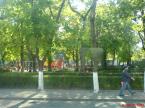Information
Sândominic () is a village and commune in Romania, located in eastern Transylvania's Harghita County. According to the 2002 census, the population numbers 6,401, of whom 6,297 (98.4%) identify as Hungarians. The village's population is overwhelmingly Székely and Roman Catholic, although the census also recorded 74 Roma, 29 Romanians and 1 German.<ref> Census data</ref>
Because the majority of the population speaks Hungarian, the name Sândominic is generally used only for official governmental purposes; in almost all cases the people refer to the village simply as Domokos.
Location
Sândominic is located in the upper reaches of the Olt valley, 29 kilometres north of Miercurea Ciuc. The mountain pass to the northeast, leading to the village of Izvorul Mureşului () and on to the large town of Gheorgheni (), marks the northern boundary of the unofficial region of Felcsík.The northern reaches of the village follow the descent of the river Olt to the town centre. Within the town limits, the Lok and Szádakút brooks meet the river, which then flows south to the village of Tomesti (). In 1967, the northern village of Bălan (), long a part of the commune but by then more populous than the central village, gained official town status and was separated from Sândominic; however, the two settlements still share important economic and transport links.
The village is served by the Izvorul Olt station of Romanian State Railways, on the Războieni-Târgu Mureş-Deda-Miercurea Ciuc-Sfântu Gheorghe-Braşov line.
History
There is evidence of Székely settlement on the site of Sândominic in the 14th century. In the Middle Ages, the village was the site of iron and copper mining (a tradition carried on to this day in Bălan.) The name Zenth Domokos, a Germanization of the Hungarian, appears in a document from 1567. The village gained notoriety for an incident of 3 November 1599 at the field of Pásztorbükk. On this day, Székely irregulars, allied in the Long War with Michael the Brave () against the Hungarian nobility, murdered a retreating, defeated Cardinal Báthory András, Prince of Transylvania. Pope Clement VIII responded by excommunicating the village.In 1920, Sândominic, like the rest of Transylvania, passed with the Treaty of Trianon from Hungarian to Romanian control. The region passed again to Hungary with the 1940 Treaty of the Belvedere (also known as the Second Vienna Award). In 1944, the village was the site of particularly bloody reprisals by Romanian irregulars participating in the recapture of Transylvania from this Hungarian control; a small monument in the village's central square bears witness to the 14 victims, among them an 86-year-old woman.
Religious sites and buildings
Sândominic's Roman Catholic church was constructed between 1787 and 1802, and still preserves numerous relics and treasures from the Middle Ages. A Greek Catholic church was completed in 1787, and there is also a small Romanian Orthodox church. Numerous chapels are scattered around the village, including the chapel at Pásztorbükk.A small village museum, containing historic farm equipment, costumes and weaponry, has been installed in the upper floor of the former House of Culture. The lower floor retains its function as a meeting-hall and often hosts musical and theatrical events.
Examples of the famous "Székely gates," richly carved wooden gates often several metres in height, can be seen throughout the village. For this and other reasons, Sândominic has long attracted the attention of ethnologists and anthropologists.
People
- Márton Áron (1896-1980), longstanding Roman Catholic bishop of Alba Iulia (
- Kurkó Gyárfás (1909-1983), political writer and politician.
References
<div class="references-small"><references/></div>
External links
Sândominic (Csíkszentdomokos) on the site of the Harghita County Council.SândominicSândominic

 English
English









